- Home
- Barry Unsworth
Sacred Hunger Page 26
Sacred Hunger Read online
Page 26
Some close bargaining followed, at which the seamen were at a disadvantage, it proving impossible for them to keep eagerness for the liquor out of their eyes.
Billy’s kerchief and a copper ring belonging to Deakin were all that the negroes seemed interested in, once they had clearly understood that the gold band in Haines’s ear and the hand-axes were not negotiable.
Neither Wilson nor Calley nor Sullivan had anything at all to offer. The bargain was finally clinched by Haines, who dug in his waistcoat pocket and produced a brass button. ‘Here you are, I’ll throw this in,” he said, and perhaps there was something in his voice and manner, and in the quality of stillness now investing all the white men, that caused the negroes to close on the offer.
“Let me see that button,” Sullivan said, but he was too late comx was in the black man’s hand now; attempts to retrieve it might have led to dangerous misunderstandings. “That was my button,” he said to the boatswain. “That button was off me coat.”
“What are you talkin” about?”’ Haines said carelessly. His eyes were on the wine. ‘Get out of the way. Come on, lads, it is share and share alike, hoist the liquor up on the beach.”
Thus Haines, with assumed good-fellowship, sought to appear to the others as the provider of the feast, so as to keep a semblance of authority. A natural leader might have carried this off, but a natural leader would have been more loved than Haines, who in fact was not loved at all and knew it, but was led into unwisdom now by his wish to get drunk.
The negroes departed with dignity and without farewells, making upstream again, their paddles dipping in perfect unison. The first of the gourds began to pass round the seated circle of men. The wine was clouded and sweetish, still fermenting slightly, very potent. The men had eaten nothing since morning. For perhaps half an hour all was harmony and accord among them. The drink passed round. It was cooler now and they were grateful for the leisure after their hours of toil, and for the ease that came to their limbs with the slow onset of drunkenness.
Sullivan, however, brooded. He was a convivial soul, especially in his drink, but he sat silent now. He was not vindictive like Wilson, who was at odds with the world and could not absorb his wrongs without violence. Life had dealt blows to Sullivan. Vagrancy and beggary, interspersed by spells at sea, had been his condition for almost as long as he could remember and he had seen the inside of prison more than once; but he had been blessed with a spirit of optimism, feckless perhaps, but saving him from that saddest of human destinies, which we call learning from one’s mistakes. Sullivan had a short memory for mistakes as well as for wrongs. But to be robbed and then treated with contumely is hard to bear. To see Haines making play with what he was convinced was one of his buttons had caused him deep offence.
By the time the third calabash began circulating, drunkenness was general and advanced. The talk had turned to money and what it could buy. It was the opinion of Wilson that money could buy anything.
“If a man has enough on it,” he said, “it’ll buy him owt i” the world. Anythin’ an’ anybody.” His deep-set eyes had a glinting look and there was a quarrelsome note in his voice as he looked round the circle of faces. “I know the world,” he said.
“Nobody’s sayin” you don’t,” Blair said, roused as always to combativeness by any hint of it in another. He leaned his small, pugnacious face forward, blinking to get the hulking Yorkshireman into focus. ‘no use yappin” on, shipmate,” he said. ‘Billy Blair knows the world better’n any man here, but that’s no bleddy argument. What about them that has all the money they need an” live in palaces an’ have servants to wait on “em? What about the Prince o’ Wales or the Archbishop o’ Canterbury? Are you sayin’ King George would be interested in yor money?”’
Wilson’s head sank down and he passed a tongue over his lips as he considered this. ‘Kings an” bishops, is it?”’ he said with slow displeasure. ‘Why is tha bringin” them in?”’
‘nobody has everything they want,” Deakin said in his fiat, expressionless voice, to which the drink had made no difference. “There would always be something, if you could find it out. Might be only some little thing.”
“Some little thing,” Calley said in slurred echo of his friend. He smiled slackly, his eyes wide and unsteady. What could it be? he wondered. Something he might find himself, a piece of coloured stone, a bird’s feather…
Wilson raised his head and fixed Billy with a sombre stare. “What dost tha mean by talkin” o’ King George?”’ he said. ‘Tha’s always tryin” to be clever.” Suspicion came to his face. “I see thy game,” he said. “Tha’s tryin” to trap me into speakin’ agin the king.”
‘Stow that gab, lads,” Haines said. “What you are talkin” about was all writ in the Bible long years ago.” He gazed at the disputants with heavy-lidded dignity. ‘Him that has got something already must always try to get hold of more,” he said.
“An” the more he gets, the more will be given to him.
That is in the Gospels.” He paused, passing a hand over his dark stubble and squinting at Wilson and Blair. ‘What that means, my likely lads, is that it is everyone’s bounden duty to try to get more than they have got already. If you have got two shillin” you try to make it into four shillin’ an’ you try to make that…” The boatswain paused here again, slightly losing the thread of his discourse. ‘There is no end to it,” he said. “An” the more you have to show for it, the more the bridegroom will be pleased with you when he comes in the night. I was brung up on the Bible,” he said, with a sudden, bitter twist of the mouth.
He would have done better to keep quiet. His discipline had never been more than brutality and there was no one to support him here.
‘Who the pox is the bridegroom?”’ Billy said with sudden ferocity.
“We was talkin” between friends, wasn’t we, Billy?”’ Wilson said. ‘Why is he stickin” his oar in? This cuddy got me a floggin’.”
He looked at Haines as though seeing him for the first time. ‘Dost tha want thy jaw broke?”’ he said.
But it was Sullivan who was first on his feet.
“Is that why you stole me buttons?”’ he demanded, swaying slightly from side to side.
“That’s the divil’s book you’ve been readin”.
You done well. You done better than thim fellers in the parable, you made no buttons into six buttons just with a snip or two of the scissors. The bridegroom will be proud of you, Haines, bejabbers, he will take you to hell with pleasure.”
The boatswain sat still for a moment. Then he scrambled to his feet, staggered, recovered. ‘allyou blasted Irish scudder,” he said, “are you callin” William Haines a thief?”’
Sullivan had raised his fists but Billy was up now and between the two men. He knew Haines was too strong for the Irishman and suspected that his own chances were not much better, though nothing of this doubt appeared in his bearing. ‘Come on, then,” he said, half naked and profane and dark red in the face with alcohol and excitement. “Last time my hands was held behind, do you remember, you scut-head bastid?”’
However, in the event, it was Wilson who fought the boatswain. Billy, his vision still clouded, found himself pushed out of the way by the gaunt Yorkshireman, who seemed to come from nowhere, shouldering him aside and striking out at Haines in the same movement and without uttering a sound. The others scrambled to give the two men room enough.
That first blow had jolted Haines but not hurt him much. The drink had slowed him down but he had a natural agility and recovered balance quickly. He caught the advancing Wilson with a sweeping left-hand blow to the side of the head which sent him sprawling to the ground.
He was up on one knee immediately, shaking his head to clear it. He was a heavy man, without Haines’s natural athleticism, but his ugly temper had furnished him over the years with much experience of brawling. Even through the fog of drink a sort of cunning still operated in him. He got to his feet slowly and stood with his hands low and his
head hanging.
The savage urge to inflict damage on his opponent while he seemed thus defenceless made Haines unwary. He struck at Wilson with left and right. The other rode back from the full force of these blows, though the second split his lip. Then, in the moment that the boatswain was still off-balance, Wilson made his recovery, jabbed with his left hand at his opponent’s eyes and when the boatswain gave back, followed with a straight blow from the shoulder which landed square on the other man’s jaw. Haines staggered, tripped on the shingle and fell heavily.
He struggled up again but the heart was out of the fight now. The blows they had taken and the heavy falls, combining with the quantities of drink both had consumed, had put lead into their limbs. They staggered and flailed about for some minutes more, faces marked with blood, occasionally landing blows, occasionally clinging to each other for balance in what resembled a clumsy and ill-coordinated dance. The boatswain, blind now on his left side, got in the way of a swinging blow that landed high on the cheekbone and sent him reeling.
Wilson, trying to follow this up, swung at him again, missed, staggered and fell flat, winding himself.
It took him a long time to get up and when he did so the two men did not close but stood some paces apart, breathing heavily and regarding each other with a sort of bafflement.
Thus by unspoken consent the fight was abandoned, though not the quarrel—neither man offered to shake hands. The spectators had by now lost interest in the proceedings. McGann was already asleep and within a short while the others slept too, lying sprawled and stertorous on the shingle.
It was not until they were awake again and grumbling in the chillier air that they discovered that Deakin and Calley had disappeared and did not answer to their shouts. With them had gone two axes and Haines’s pistol.
Deakin and Calley heard the shouts distantly from where they crouched in the shrub some quarter of a mile upstream. Calley had been sick from the palm wine and still did not feel quite well. It seemed a lonely thing to stay hidden and make no answer to these voices.
Sitting there, lips tightly compressed to show his friend Deakin how determined he was not to make the slightest noise, he had a confused and painful memory of shouts of children on the streets, shouting his name in mockery, keeping him out—the children flowed away from him, re-formed somewhere out of his sight, always out of his sight, leaving only the fleeting, mocking reiteration of his name … These shouts now were different, asking for him, wanting to include him. They died away finally and he felt the silence settle round them both. He glanced at Deakin and saw that the other’s eyes were not looking at him or anything near at hand, but were fixed on some distant point beyond the river. Then Deakin became aware of his gaze and smiled and said in low tones, “Don’t you worry, Dan’l. I shall see you all right.”
27.
Thurso had returned from his visit to the Edgar in late afternoon, in much improved mood, having learned from Captain Macdonald that trade was brisk further east along the coast and especially in the vicinity of the Ravalli River. Thurso was intending to do some business on his own account—business which no one but Barton knew anything about. The Company of Merchants Trading to Africa, to which his owner, William Kemp, belonged, had taken over the dilapidated old fort on the coast, previously the property of the Royal Africa Company, and refurbished it, installing new cannon, strengthening the garrison and extending the slave-dungeons. According to Macdonald they had established excellent relations with the traders on the river andwiththe chiefs in the interior. Macdonald had bought two hundred and twenty-three slaves in the space of two months, he assured Thurso; only sixteen had so far died, and three of those suicides. He was staying only to take on rice and yams before leaving for the West Indies.
Had it not been for this encouraging news, the boat party might have fared much worse at their return, and especially Haines, who presented himself some several hours later than might have been expected, haggard and bruised, his left eye blackened and half closed, his shirt blood-bedabbled, minus pistol and cartridge belt and two axes, and with two of his party missing. Haines knew he had been a fool. He expected a flogging and felt it was deserved comhe had been flogged in his time for much lesser offences. In the event, he was roundly cursed by Thurso, struck in the face and confined in handcuffs and double leg irons for the night. The value of pistol and ammunition was deducted from his pay.
Much of this was done for the sake of effect. Thusts did not have high expectations of the boatswain, or any of his crew. He knew they would drink to the point of insensibility if they could get hold of liquor and that some would run if they saw an opportunity. He was angered by the loss of the two men, but the chances were that they would be recaptured. If not, he would save their wages. It was later, when the ship was fully slaved, that a full crew would be needed; and he felt fairly sure of being able to take on more men later, at Cape Mount.
Next morning, having provisioned the yawl for three days, he set off for shore, taking Paris and Simmonds with him and six members of the crew. The principal dealer along the Sherbro River was a mulatto named Tucker and he had sent word that he had slaves to sell. Four of his retainers had been dispatched to meet them and conduct them upriver to Tucker’s house. They were waiting in a light canoe in the shade of the raffia palms along the banks just within the bar, where the water eddied and sidled, flecked with muddy white.
The river was wide here and the current flowed strongly. The seamen at the oars had hard work of it to keep their guides in sight. These made against the current with astonishing swiftness in their light canoe, one man standing at prow and one at stern, leaning forward in unison to throw their weight on the long-handled paddles.
The sound of the waves breaking over the bar at the river mouth pursued them, growing sullen with distance.
They were enclosed on either side by thick walls of glossy-leaved mangrove trees. Paris sought to distract his mind from the close heat and the zealous attention of various stinging creatures by noting, for future inclusion in his journal, the naked and adventitious-seeming roots of these trees, how they arched from the parent stem while some feet from the ground to form strange stilts and buttresses.
“He is a big man in these parts, Tucker,”
Thurso said. “All the people you see here belong to him on both sides of the river.” He was as near as he could ever be to good humour this morning, with the prospect of doing business, seeing an old acquaintance, though he was sweating, Paris noticed, in his hot clothes —he was dressed in his best, with braided tricorn hat and blue and silver coat with lace at the cuffs.
“There is no trading anywhere up this river without Tucker,” he said. “He is what I call a success in life, Mr Paris. He is over seventy now and has his hair and teeth still and as rich as Croesus. And he has built it all up from nothing—not like you who had the benefit of a professional training. Everything he has got he has had to work for. It was the same with me. I don’t mind admitting it, to you or any man.” Thurso leaned forward and said in a low, hoarse mutter, “I was never handed anything on a silver plate. My parents were out of this world before I was four years old.”
“Indeed, sir?”’ Paris looked at the immobile, brick-coloured face, the small blue eyes that seemed now once again, this avowal or confession having been made, to seek for refuge further back and find none. The surgeon felt touched, though knowing this confidence quite probably came only because the captain despised him. It was the first in any case that Thurso had ever made. “You were brought up by relatives then, sir?”’ he ventured, rather diffidently; he had learned that the captain suspected the motives behind all questions.
“I was brought up by the parish.” Thurso’s face had become more forbidding. ‘The sea has been father and mother to me,” he said. “Aye, and more.” He fell silent now and looked fixedly before him in one of the fits of dark abstraction that Paris had noticed in him before.
The river had narrowed. As they went closer in to the ba
nk Paris saw the gauze and glint of honey bees high up among the small white flowers of the mangroves and caught the brackish smell from the ooze at their roots. Voices came from somewhere among the trees. They passed a landing stage made with moored rafts where women squatted, washing clothes at the waterside.
“Yes,” Thurso said, “Tucker may be a mulatto, but he is a man to be reckoned with.”
He spoke as if there had been no interval.
Small beads of sweat had started on his brow and he wiped them away with a cambric handkerchief from his sleeve, in a gesture oddly delicate for a man of his bulk. “There are times he might have as many as fifty prime slaves in his pens,” he said.
“Of course he has some customs we might object to, as coming from more civilized society. For example he has more than one wife—seven or eight, I believe. Now we might think that little better than fornication, but it is their practice hereabouts. He knows my feelings, but I don’t let it stand in the way of business. Besides, you see, there is a sound practical reason at the back of it, which you have to know these parts properly to appreciate. Just counting his own blood kin and relations by marriage, he can send upwards of a hundred men raiding upriver, and when you add to that his personal slaves and people that are in bond to him… He gives out credit to the people when they fall on bad times. They all owe him money.
They know they can be sold for slaves to pay off the debt, so they take care to keep on the right side of him. There is nothing like fear, for keeping people in order.
No, Tucker has got things very well in hand considering that he came to this coast with nothing.”
The river took a wide curve between banks of low shrub; the trees had been cleared here on both sides. Their guides waited above a balustraded wooden jetty where a boat was unloading plantains in wicker baskets. On the bankside beyond, lines of washing were hanging. Tucker himself was waiting at the top of the wooden steps that went up from the jetty.

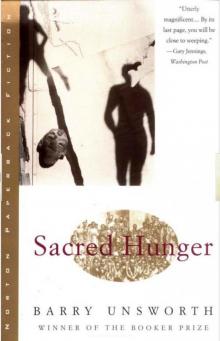 Sacred Hunger
Sacred Hunger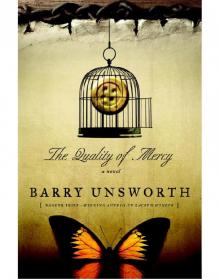 The Quality of Mercy: A Novel
The Quality of Mercy: A Novel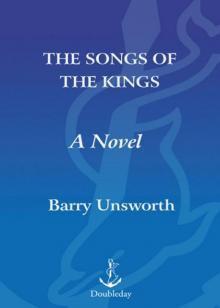 The Songs of the Kings: A Novel
The Songs of the Kings: A Novel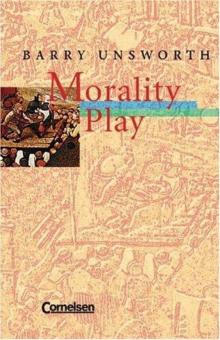 Morality Play. Mit Materialien. (Lernmaterialien)
Morality Play. Mit Materialien. (Lernmaterialien)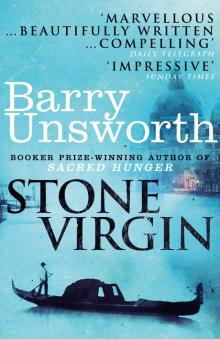 Stone Virgin
Stone Virgin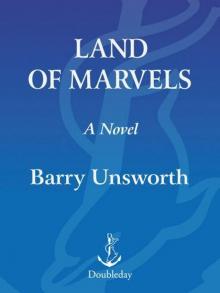 Land of Marvels
Land of Marvels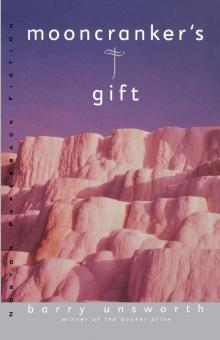 Mooncranker's Gift
Mooncranker's Gift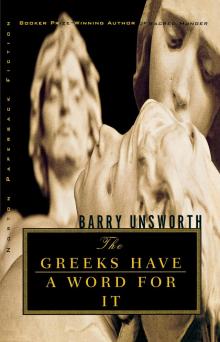 The Greeks Have a Word for It
The Greeks Have a Word for It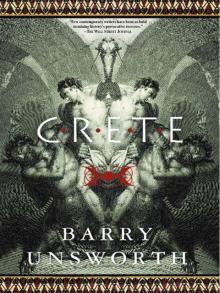 Crete
Crete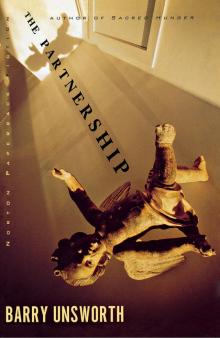 The Partnership
The Partnership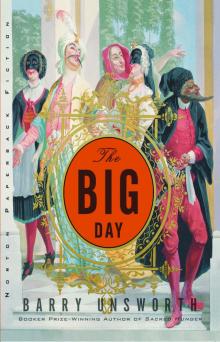 The Big Day
The Big Day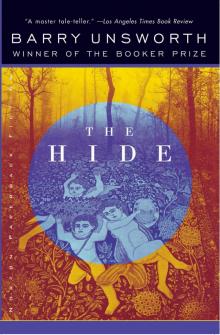 The Hide
The Hide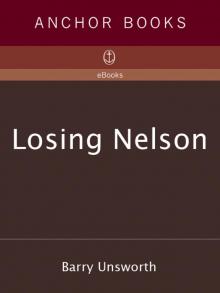 Losing Nelson
Losing Nelson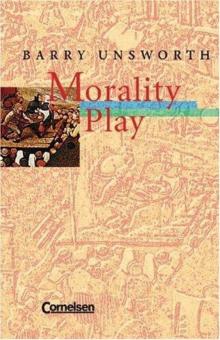 Morality Play
Morality Play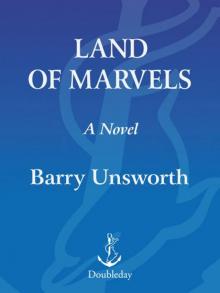 Land of Marvels: A Novel
Land of Marvels: A Novel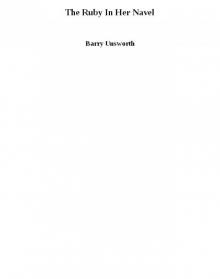 The Ruby In Her Navel
The Ruby In Her Navel